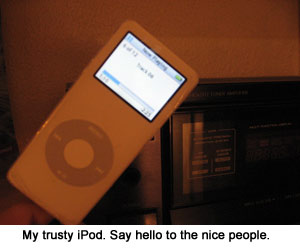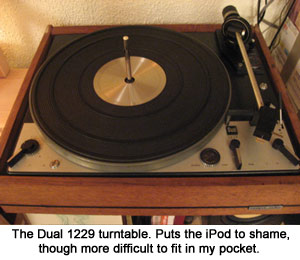 Two week’s ago, I talked about the online world has changed the face of music discovery. Today, I would like to discuss the question of the quality of music – and of course, relate it back to publishing.
Two week’s ago, I talked about the online world has changed the face of music discovery. Today, I would like to discuss the question of the quality of music – and of course, relate it back to publishing.
This week, Apple and EMI announced that they are ditching Digital Rights Management (DRM) on music that EMI makes available on iTunes. DRM is the layer of protection on top of digital music you buy online that prevents you from making a million copies of it.
Now, this “freedom” comes at a price: a 30% increase in cost per song. The bonus:
- You have more freedom in copying & using the song.
- You receive a higher quality audio recording.
Which leads us to our topic for today: Quality in the experience of listening to music.
For some, it is a live performance and for others it is a high quality recording. For most, however, the experience is all about convenience. The ability to carry around hundreds of albums in your pocket is compelling, and the iPod is at the heart of this.
Is something lost in this transition, and does it mirror the changes that we are seeing in publishing and journalism – a new model for how information is created, exchanged, used, and valued.
I am an audiophile, and have a dedicated listening room at home for my stereo that centers around a high-end turntable. I am one of those that feels vinyl is superior to CDs. But in our living room, we have a bare-bones stereo system that seems to always be on, and gives a soundtrack to the everyday activities of my wife and I.
 Up until last weekend, the living room system used an iPod Nano as its source. A handy gadget that gave us access to a wide range of music at a moments notice. On Saturday, I attended my first yard sale of the season (yes, I am one of those people), and picked up a vintage Dual 1229 turntable.
Up until last weekend, the living room system used an iPod Nano as its source. A handy gadget that gave us access to a wide range of music at a moments notice. On Saturday, I attended my first yard sale of the season (yes, I am one of those people), and picked up a vintage Dual 1229 turntable.
This is a 34 year old record player that is still highly regarded in the audio community, and I added it to my little living room system. Digging into my vinyl, I was taken aback at how alive the music was compared to the iPod.
But has this appreciation of quality become something that is only valued by a fringe community of enthusiasts? Will a similar thing happen within publishing – that many want to retain the values of an earlier age of publishing – but find that the tidal wave of MySpace, blogs, podcasts, video, and other social media have a more powerful voice?
I am not trying to predict the demise of any form of media, content type, or writing style. But I do look at fellow audiophile Mike Lavigne’s $32,000 speaker cable as a sign of one group’s pursuit of quality of experience – as compared to most others’ pursuit of convenience of experience.
As I consume media, watch those around me do the same, look at the habits of the next generation, and keep track of worldwide trends – I can’t help but find these comparisons, and wonder if today’s teenagers will hold the same esteem for traditional publishing and media as we do.
Yesterday’s New York Times had an article that tracks the changes that the music industry has experienced in the past 5+ years:
“The major labels wanted to kill the single. Instead they killed the album. The association wanted to kill Napster. Instead it killed the compact disc. And today it’s not just record stores that are in trouble, but the labels themselves, now belatedly embracing the Internet revolution without having quite figured out how to make it pay.”
